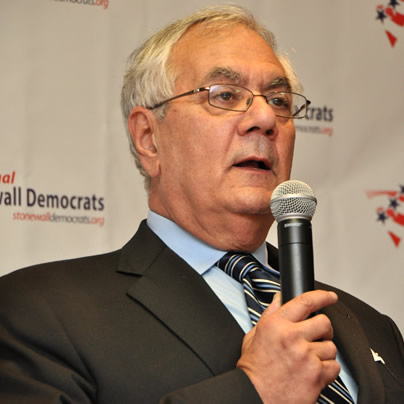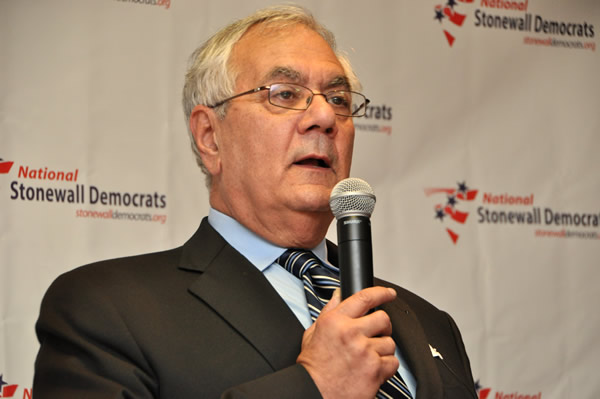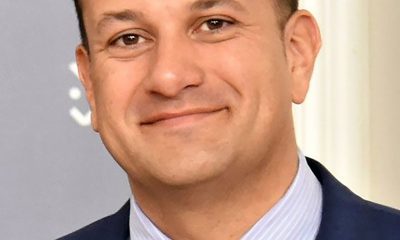National
Frank ‘troubled’ by process of naming interim senator
Gay former lawmaker passed over for role


Rep. Barney Frank said he wished being LGBT would weigh more as a diversity factor (Blade file photo by Michael Key)
Former Rep. Barney Frank said he wishes consideration of being LGBT would have been weighed more heavily as a diversity factor in the decision to appoint an interim U.S. senator from Massachusetts.
In a brief interview with the Washington Blade on Wednesday, Frank said he didn’t want to discuss his personal feelings about Gov. Deval Patrick (D-Mass.) passing him over for the role in favor of former chief of staff William “Mo” Cowan, but noted he was “eager to get in and work on the issues.”
“But let me tell you, there was one thing that sort of troubled me in the discussion about it — nobody was particularly quoted; they attributed something to governor’s office and others — was that the governor would want to appoint someone who’s either a minority or a woman,” Frank added. “And what troubled me is the question of LGBT people was just kind of swept out. I’ve never asked for any appointment based on me being gay, but when they begin talk about the importance of diversity and leave us out, that troubles me.”
While Cowan’s appointment was hailed a milestone for diversity in terms of race because he’s black, Frank said the lack of attention to being LGBT as a diversity factor suggests those involved with the decision were unaware of President Obama’s inaugural address in which he mentioned the 1969 Stonewall riots in the same line as other iconic civil rights moments.
“It’s almost as if some people didn’t listen to the president when he said, ‘Seneca, Stonewall and Selma,’ and didn’t hear the Stonewall part,” Frank said.
Additionally, Frank said he thinks being first the person in the Senate who’s in a same-sex marriage would have had an impact on other senators.
“Just as it was in the House, I think being a same-sex married couple in the Senate could have took an important lesson home to some of them,” Frank said.
Patrick’s office didn’t immediately respond to a request to comment.
The former lawmaker was public about his interest in the position of interim U.S. senator, telling the Boston Globe he believes his experience in finance would be beneficial as the Senate takes on budget issues.
Frank said he met Cowan a couple of times when they were working together on a project for Massachusetts’ 4th congressional district, but doesn’t know him well enough to evaluate whether he’d be a good interim senator.
“I don’t know him well,” Frank said. “I assume anybody is going to vote a particular way in Massachusetts. I don’t know him well enough to be able to judge.”
After announcing he was interested in the interim position, Frank reversed himself on earlier opposition to the appointment of former Sen. Chuck Hagel as defense secretary based on 1998 anti-gay comments made against James Hormel and came out in support of the nomination. Hagel’s confirmation hearing is Thursday.
Even though he was passed over for the interim job, Frank said he’s still supportive of Hagel based on a desire to end the war in Afghanistan and reduce the military budget, despite those anti-gay remarks.
“I don’t think there’s any excuse for it; I wish Obama had appointed somebody else,” Frank said. “I guess what I have to say about Hagel, there’s an old Arab proverb, I’m told, “The enemy of my enemy is my friend.” That makes Hagel my friend-enemy. My unhappiness over his bigoted comment is outweighed by the substance today of whether or not we pull out of Afghanistan and cut the military budget.”
Frank also had positive things to say about President Obama’s gay inclusion in the inaugural address, calling it a “victory lap” after Obama’s earlier endorsement of same-sex marriage and victory at the polls.
“When he did that, it was both a celebration and a reinforcement for the future,” Frank said.

The Comings & Goings column is about sharing the professional successes of our community. We want to recognize those landing new jobs, new clients for their business, joining boards of organizations and other achievements. Please share your successes with us at [email protected].
Congratulations to Gil Pontes III on his recent appointment to the Financial Advisory Board for the City of Wilton Manors, Fla. Upon being appointed he said, “I’m honored to join the Financial Advisory Board for the City of Wilton Manors at such an important moment for our community. In my role as Executive Director of the NextGen Chamber of Commerce, I spend much of my time focused on economic growth, fiscal sustainability, and the long-term competitiveness of emerging business leaders. I look forward to bringing that perspective to Wilton Manors — helping ensure responsible stewardship of public resources while supporting a vibrant, inclusive local economy.”
Pontes is a nonprofit executive with years of development, operations, budget, management, and strategic planning experience in 501(c)(3), 501(c)(4), and political organizations. Pontes is currently executive director of NextGen, Chamber of Commerce. NextGen Chamber’s mission is to “empower emerging business leaders by generating insights, encouraging engagement, and nurturing leadership development to shape the future economy.” Prior to that he served as managing director of The Nora Project, and director of development also at The Nora Project. He has held a number of other positions including Major Gifts Officer, Thundermist Health Center, and has worked in both real estate and banking including as Business Solutions Adviser, Ironwood Financial. For three years he was a Selectman, Town of Berkley, Mass. In that role, he managed HR and general governance for town government. There were 200+ staff and 6,500 constituents. He balanced a $20,000,000 budget annually, established an Economic Development Committee, and hired the first town administrator.
Pontes earned his bachelor’s degree in political science from the University of Massachusetts, Dartmouth.
Kansas
ACLU sues Kansas over law invalidating trans residents’ IDs
A new Kansas bill requires transgender residents to have their driver’s licenses reflect their sex assigned at birth, invalidating current licenses.

Transgender people across Kansas received letters in the mail on Wednesday demanding the immediate surrender of their driver’s licenses following passage of one of the harshest transgender bathroom bans in the nation. Now the American Civil Liberties Union is filing a lawsuit to block the ban and protect transgender residents from what advocates describe as “sweeping” and “punitive” consequences.
Independent journalist Erin Reed broke the story Wednesday after lawmakers approved House Substitute for Senate Bill 244. In her reporting, Reed included a photo of the letter sent to transgender Kansans, requiring them to obtain a driver’s license that reflects their sex assigned at birth rather than the gender with which they identify.
According to the reporting, transgender Kansans must surrender their driver’s licenses and that their current credentials — regardless of expiration date — will be considered invalid upon the law’s publication. The move effectively nullifies previously issued identification documents, creating immediate uncertainty for those impacted.
House Substitute for Senate Bill 244 also stipulates that any transgender person caught driving without a valid license could face a class B misdemeanor, punishable by up to six months in jail and a $1,000 fine. That potential penalty adds a criminal dimension to what began as an administrative action. It also compounds the legal risks for transgender Kansans, as the state already requires county jails to house inmates according to sex assigned at birth — a policy that advocates say can place transgender detainees at heightened risk.
Beyond identification issues, SB 244 not only bans transgender people from using restrooms that match their gender identity in government buildings — including libraries, courthouses, state parks, hospitals, and interstate rest stops — with the possibility for criminal penalties, but also allows for what critics have described as a “bathroom bounty hunter” provision. The measure permits anyone who encounters a transgender person in a restroom — including potentially in private businesses — to sue them for large sums of money, dramatically expanding the scope of enforcement beyond government authorities.
The lawsuit challenging SB 244 was filed today in the District Court of Douglas County on behalf of anonymous plaintiffs Daniel Doe and Matthew Moe by the American Civil Liberties Union, the ACLU of Kansas, and Ballard Spahr LLP. The complaint argues that SB 244 violates the Kansas Constitution’s protections for personal autonomy, privacy, equality under the law, due process, and freedom of speech.
Additionally, the American Civil Liberties Union filed a temporary restraining order on behalf of the anonymous plaintiffs, arguing that the order — followed by a temporary injunction — is necessary to prevent the “irreparable harm” that would result from SB 244.
State Rep. Abi Boatman, a Wichita Democrat and the only transgender member of the Kansas Legislature, told the Kansas City Star on Wednesday that “persecution is the point.”
“This legislation is a direct attack on the dignity and humanity of transgender Kansans,” said Monica Bennett, legal director of the ACLU of Kansas. “It undermines our state’s strong constitutional protections against government overreach and persecution.”
“SB 244 is a cruel and craven threat to public safety all in the name of fostering fear, division, and paranoia,” said Harper Seldin, senior staff attorney for the ACLU’s LGBTQ & HIV Rights Project. “The invalidation of state-issued IDs threatens to out transgender people against their will every time they apply for a job, rent an apartment, or interact with police. Taken as a whole, SB 244 is a transparent attempt to deny transgender people autonomy over their own identities and push them out of public life altogether.”
“SB 244 presents a state-sanctioned attack on transgender people aimed at silencing, dehumanizing, and alienating Kansans whose gender identity does not conform to the state legislature’s preferences,” said Heather St. Clair, a Ballard Spahr litigator working on the case. “Ballard Spahr is committed to standing with the ACLU and the plaintiffs in fighting on behalf of transgender Kansans for a remedy against the injustices presented by SB 244, and is dedicated to protecting the constitutional rights jeopardized by this new law.”
National
After layoffs at Advocate, parent company acquires ‘Them’ from Conde Nast
Top editorial staff let go last week

Former staff members at the Advocate and Out magazines revealed that parent company Equalpride laid off a number of employees late last week.
Those let go included Advocate editor-in-chief Alex Cooper, Pride.com editor-in-chief Rachel Shatto, brand partnerships manager Erin Manley, community editor Marie-Adélina de la Ferriére, and Out magazine staff writers Moises Mendez and Bernardo Sim, according to a report in Hollywood Reporter.
Cooper, who joined the company in 2021, posted to social media that, “Few people have had the privilege of leading this legendary LGBTQ+ news outlet, and I’m deeply honored to have been one of them. To my team: thank you for the last four years. You’ve been the best. For those also affected today, please let me know how I can support you.”
The Advocate’s PR firm when reached by the Blade said it no longer represents the company. Emails to the Advocate went unanswered.
Equalpride on Friday announced it acquired “Them,” a digital LGBTQ outlet founded in 2017 by Conde Nast.
“Equalpride exists to elevate, celebrate and protect LGBTQ+ storytelling at scale,” Equalpride CEO Mark Berryhill said according to Hollywood Reporter. “By combining the strengths of our brands with this respected digital platform, we’re creating a unified ecosystem that delivers even more impact for our audiences, advertisers, and community partners.”
It’s not clear if “Them” staff would take over editorial responsibilities for the Advocate and Out.




















